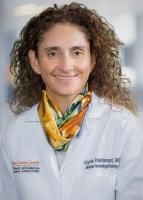- Center on Health Equity & Access
- Clinical
- Health Care Cost
- Health Care Delivery
- Insurance
- Policy
- Technology
- Value-Based Care
SABCS 2023 Sessions Touch on "Every Aspect of Breast Cancer"
The 46th annual San Antonio Breast Cancer Symposium will take place December 5-9, with new and experienced attendees able to choose and learn from a schedule overflowing with the latest developments in breast cancer science and research.
From December 5-9, the Henry B. Gonzalez Convention Center in San Antonio, Texas, will once again host the annual San Antonio Breast Cancer Symposium (SABCS), now in its 46th year. State-of-the-art sessions (formerly Forums), late-breaking abstracts, 1500-plus posters, workshops, educational sessions, spotlight presentations, and plenary lectures will be spread out over 4 days full of the latest developments in breast cancer science and research.
Virginia G. Kaklamani, MD
UT Health San Antonio

“We’ve tried to touch on pretty much every aspect of breast cancer. We’re looking at disparities, we’re looking at different subtypes of breast cancer, we’re looking at different therapies,” said Virginia G. Kaklamani, MD, SABCS co-director and professor of medicine, Division of Hematology/Oncology at UT Health San Antonio and leader of the Breast Cancer Program at UT Health San Antonio MD Anderson Cancer Center. “We’re looking at resistance in all types of breast cancer. We’re really trying to globally attack breast cancer.”
An exciting new development this year is the expansion of abstract categories, which now include artificial intelligence, computational biology, and systems biology; behavioral and population science; breast cancer risk, genetics, and prevention; cancer health disparities; clinical biomarkers, translational research, and precision medicine; drug discovery, design, and delivery; experimental therapeutics and early-phase trials; imaging/early detection; molecular and cell tumor biology; radiation oncology; real-world data and real-world evidence; and surgery.
There will be 2 plenary lectures. “Breast Cancer Evolution, Immune Evasion and Metastasis Driven by Chromosomal Instability,” will be given by Charles Swanton, PhD, BSc, FRCP, deputy clinical director at The Francis Crick Institute, on Thursday, December 7, and “Recent Advances in Triple Negative Breast Cancer,” will be delivered by Melinda L. Telli, MD, associate professor of medicine, Stanford University School of Medicine.
Highlighted educational sessions will be on breast cancer prevention, lobular breast cancer, and inflammatory breast cancer, which was voted on by attendees of last year’s conference as an educational session they would like to see at this year’s meeting, according to Kaklamani.
Noted trials presenting data in the general sessions include HER2CLIMB-02, examining tucatinib and trastuzumab emtansine to treat metastatic HER2-positive breast cancer; KEYNOTE-756, investigating pembrolizumab or placebo plus chemotherapy in the neoadjuvant setting followed by adjuvant pembrolizumab or placebo plus endocrine therapy in the adjuvant setting in estrogen receptor (ER)–positive/HER2-negative breast cancer; CheckMate 7FL, exploring neoadjuvant chemotherapy and adjuvant endocrine therapy (nivolumab), also in ER-positive/HER2-negative primary breast cancer; NSABP B-51, evaluating radiation therapy following neoadjuvant chemotherapy and surgery for early-stage disease; and IDEA, studying endocrine therapy alone following breast-conserving surgery in postmenopausal women.
The results from NSABP B-51 and IDEA could be “practice changing,” Kaklamani believes.
Triple-negative breast cancer (TNBC) also will be a hot topic of discussion, with 31 sessions in total. Topics of discussion are many: precision immunotherapy and tumor immune architecture, systemic therapy in early-stage disease, circulating tumor DNA’s use in the metastatic setting, abemaciclib as monotherapy and in combination, prenatal BRCA1 epimutations, atezolizumab plus adjuvant chemotherapy for stage II/III TNBC, KEYNOTE-522 and -355 data, and recent treatment advances—among many.
Networking opportunities, too, will abound, with those still in the early stages of their careers and those who have completed their training able to take advantage of career development–focused forums. On Saturday, the Career Development Forum will provide guidance to early-career researchers for how to plan their first clinical trials and grant writing tips and tricks, and “Navigating Success: Women’s Career Development,” will see accomplished female scientists use the histories of their research career experiences to mentor and help the next generation of women in science to strategize their way to success and overcome gender-related challenges.
The content at SABCS this year is vast, and comprehensive, and full of novel research that will demonstrate both the progress made in treating and preventing breast cancer and how much work yet remains for a cure.
